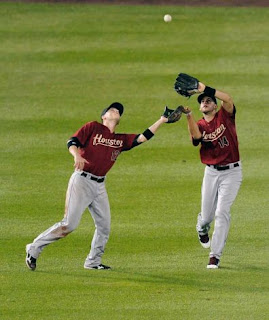Communication tips for defense
 |
What fielders specifically say to each other on
plays like this is extremely important. |
In May 1988, I was playing for Villanova University in the Big East Conference Championship against St. John’s. The winner moved on to the regional tournament and the loser went home. We lost. Anyway, towards the end of the game, our second baseman and I learned a lesson about the importance of communication on defense. With runners on base, a ball was hit into the left-centerfield gap and rolled to the wall. We both went out to set up a double-relay because it was likely there was going to be a play at the plate. I was the lead guy out and the second baseman was the trailer. When the ball was thrown to me by the outfielder, the second baseman, who acted as my eyes on the play, yelled “Home!, Home!” The problem was, I didn’t hear “Home! Home!” My ears heard “Hold! Hold!” I caught the ball and turned to run the ball in. After a step I realized what happened. Unfortunately, it was too late. The run easily scored. It was a close game so that run meant a lot in the outcome of the game.
The lesson learned was that a defense must give some thought to the words and phrases used when directing and reminding teammates on the various plays they encounter. In my example, I now know that using base numbers works best. Yelling “Two! Two!,” “Three! Three!,” or “Four! Four!” makes it very clear where the ball should go. I was just as guilty because “Home!” is what I would to yell when I was the trailer. Lesson learned the hard way.
Another example of this is when two or more players are both going for the ball. Many are taught to yell “I got it!” More recently I heard a coach speak about how it’s better to say “Ball!” instead of “I got it!” His rationale was that when a player says “I got it!” he has to say three words to send one message. Yelling “Ball! Ball! Ball!” uses one word to send the message three times. More efficient and more effective in his mind. He’s got a point.
I heard a funny story about this type of play involving the late former Phillie and Hall of Famer Richie Ashburn. He was speaking at a banquet and gave this story. Apparently, while playing center field, he had a couple collisions with a left fielder who didn’t speak English. The left fielder did not understand Ashburn’s “I got it!” and continued to go after the ball causing the collisions. He sat down with the player and agreed to switch to saying “es mio!” (Spanish for “mine!“) on those plays. The next game a shallow fly ball is hit and both Ashburn and the left fielder go for the ball. Ashburn yelled “Es Mio!” and the left fielder backed off. Unfortunately, the shortstop was American, didn’t know Spanish, and ended up colliding with Ashburn. Sometimes you just can’t win!
The moral is, be sure that the words and phrases you decide to use are known and easily understood by all players before the balls start being hit.






Leave a Reply